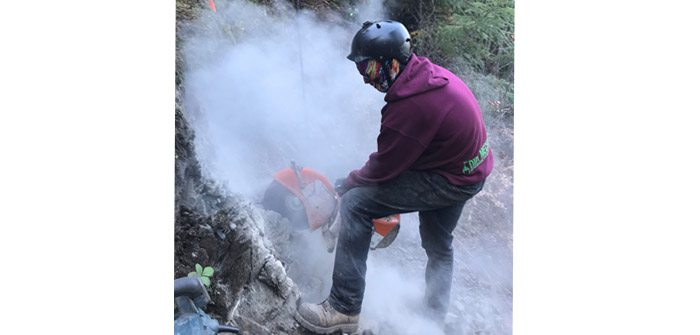(Photo | Courtesy of Dirt Mechanics LLC)
Bend’s Dirt Mechanics is being featured for their creative response to the pandemic. Owner Paul Lissette talked with SAIF about how the excavation company has adapted, taking steps to ensure their employees are safe on the job.
The full Q&A is below. SAIF is sharing these stories to both celebrate how small businesses are managing the pandemic, and to help other organizations find tips and advice that may work for them.
“We know this has been an incredibly hard year for Oregon businesses, but we’ve been humbled by how small businesses are responding,” said Judi Croft, safety services manager, about the campaign. “The small-business community has always been about collaborating and sharing best practices, and we hope these stories help businesses see what has worked well.”
See the growing series on saif.com/stories, where more businesses will be added over the coming weeks. More information on keeping your workplace safe during the pandemic can be found at saif.com/coronavirussafety.
Dirt Mechanics LLC in Bend specializes in designing and creating hiking and biking trails, bridges, kiosks and other structures for individuals and state agencies. Paul Lissette started Dirt Mechanics in 2012 to combine his general contracting and business experience with his passion for building trails. SAIF spoke to Paul about his experiences during the coronavirus pandemic.
How did the pandemic affect your business?
Due to the already isolated nature of our work, Dirt Mechanics didn’t need to shut down. We generally live onsite, camping in the forest in our own campers. Plus, we work outside and always have meetings trailside.
After the original notice from Governor Kate Brown in March to help prevent the spread of COVID-19, Dirt Mechanics immediately adopted the required guidelines. We no longer traveled to the job site in a single vehicle; instead, employees were asked to drive their own vehicles or ride bicycles.
Each employee was given their own set of hand tools and worked on their own section of trail. We followed social distancing and minimized our exposure to other people. If employees had to work within six feet of each other, they wore masks. We also provided various forms of sanitizer.
While my immediate work wasn’t affected by COVID-19, a lot of my pre-scheduled fall 2020 work was canceled by various agencies due to budget constraints. I adapted by finding other contracting work. Dirt Mechanics has two to five employees, depending on workload and employee turnover. Unfortunately, I couldn’t keep the whole crew going full-time. COVID-19 also prevented me from hiring two more people this year.
How did it affect staff?
Each employee was affected differently, but we all realized how fortunate we were to be able to continue working while so many others found themselves unemployed with little to no notice.
Having been an employee before self-employment, I know what it means to feel that you’re appreciated by your boss and place of employment. The safety and well-being of an employee are paramount, so taking the threat of COVID-19 seriously was of utmost importance for the physical and mental well-being of all employees.
How did it affect customers?
The small number of customers I encounter directly in my line of work were mostly very accepting, understanding and appreciative of our efforts.
What were the most difficult parts of adapting to the pandemic, and what, in hindsight, do you wish you’d done differently?
The most difficult parts were making sure we all kept socially distanced from one another and cleaning all surfaces.
Will you use any of the new approaches and practices after the pandemic is over?
Once the pandemic is over, we may relax somewhat. However, we’ll continue to encourage employees to stay home when ill, maintain good camp hygiene and respect others’ personal space.
What advice would you give business owners trying to adapt to the pandemic?
Listen to the experts and follow their advice. Nobody wants things to shut down. Precaution upfront can save a lot of headache, worry and financial misfortune down the line.





